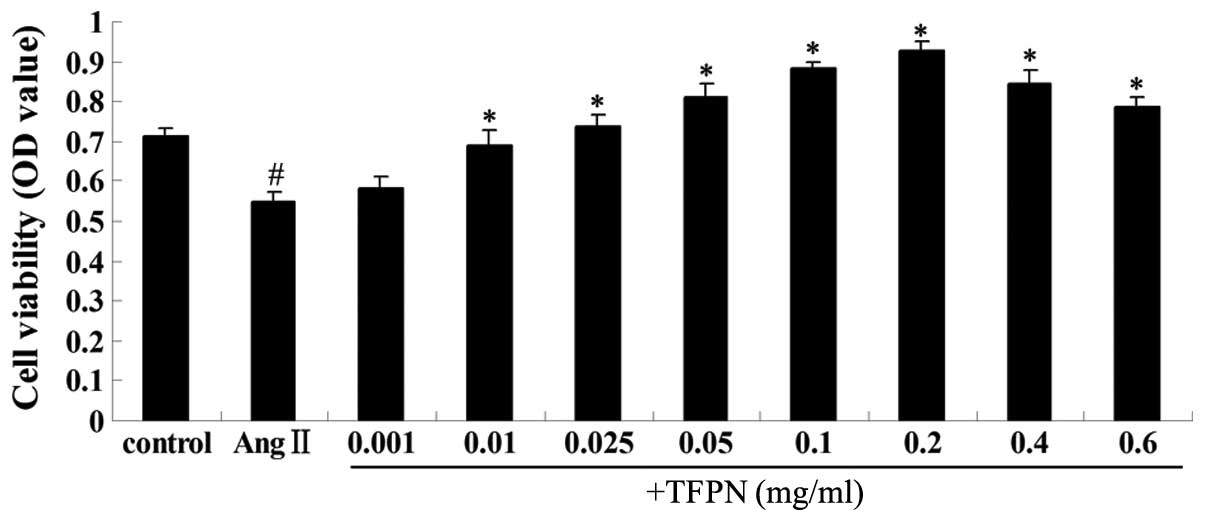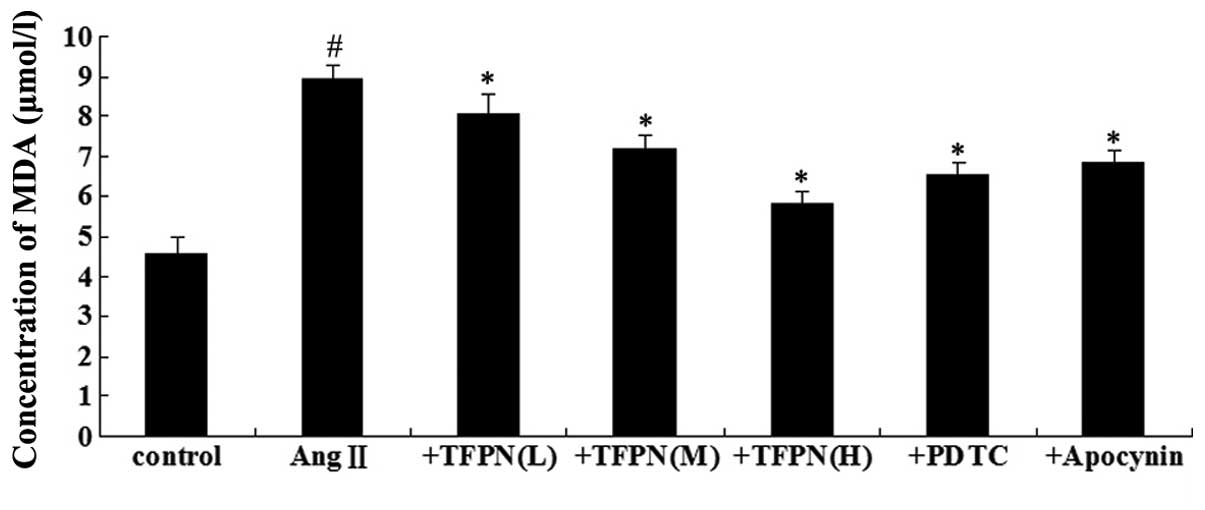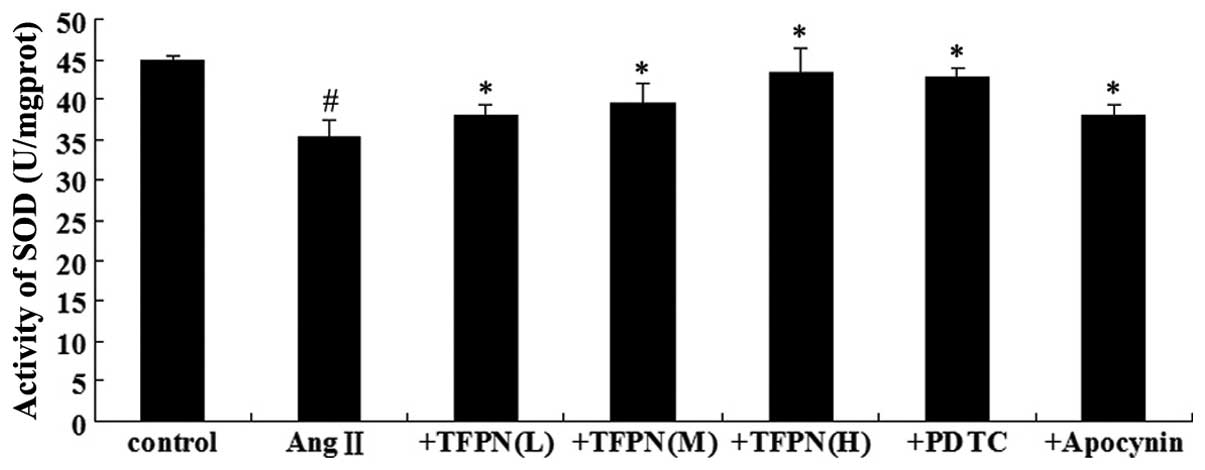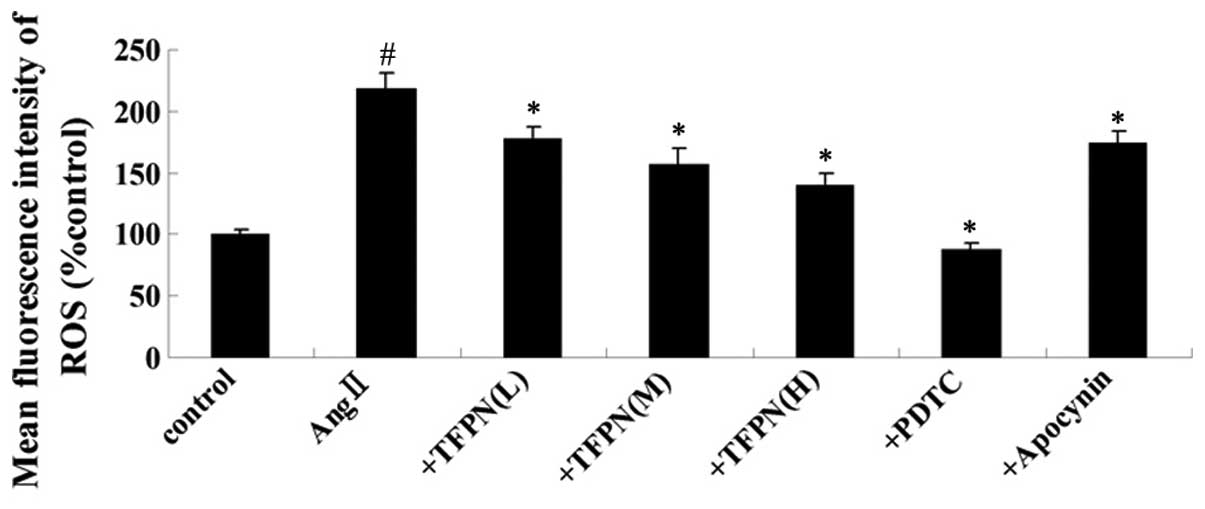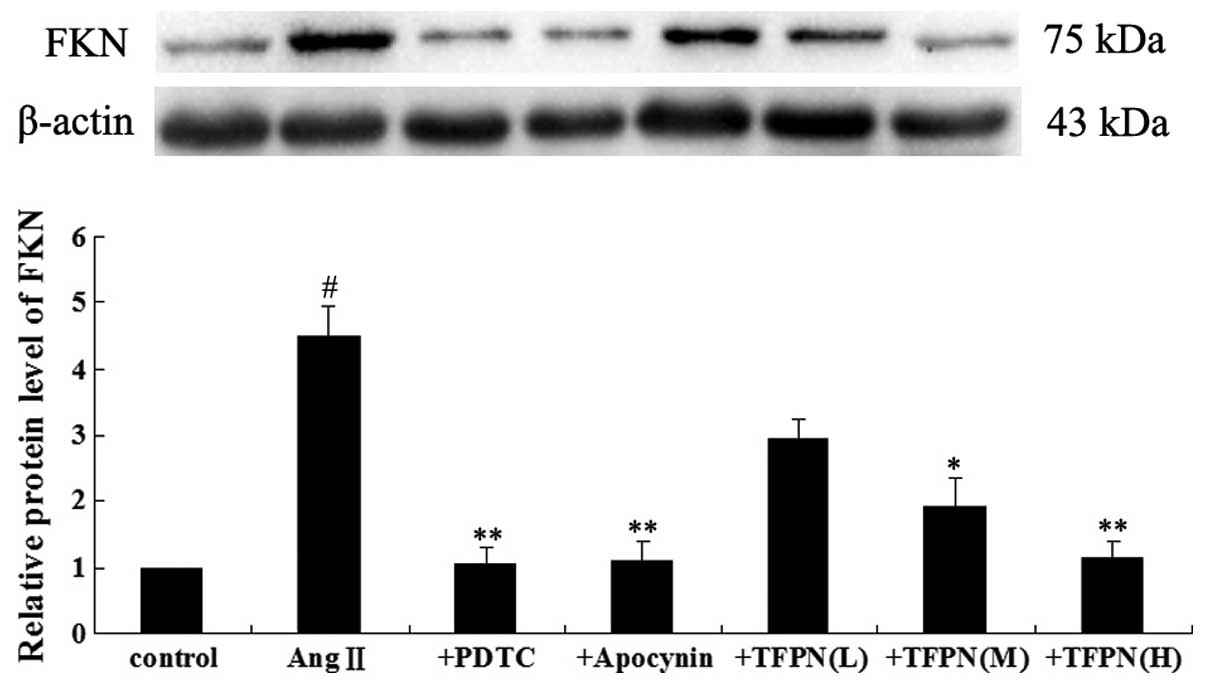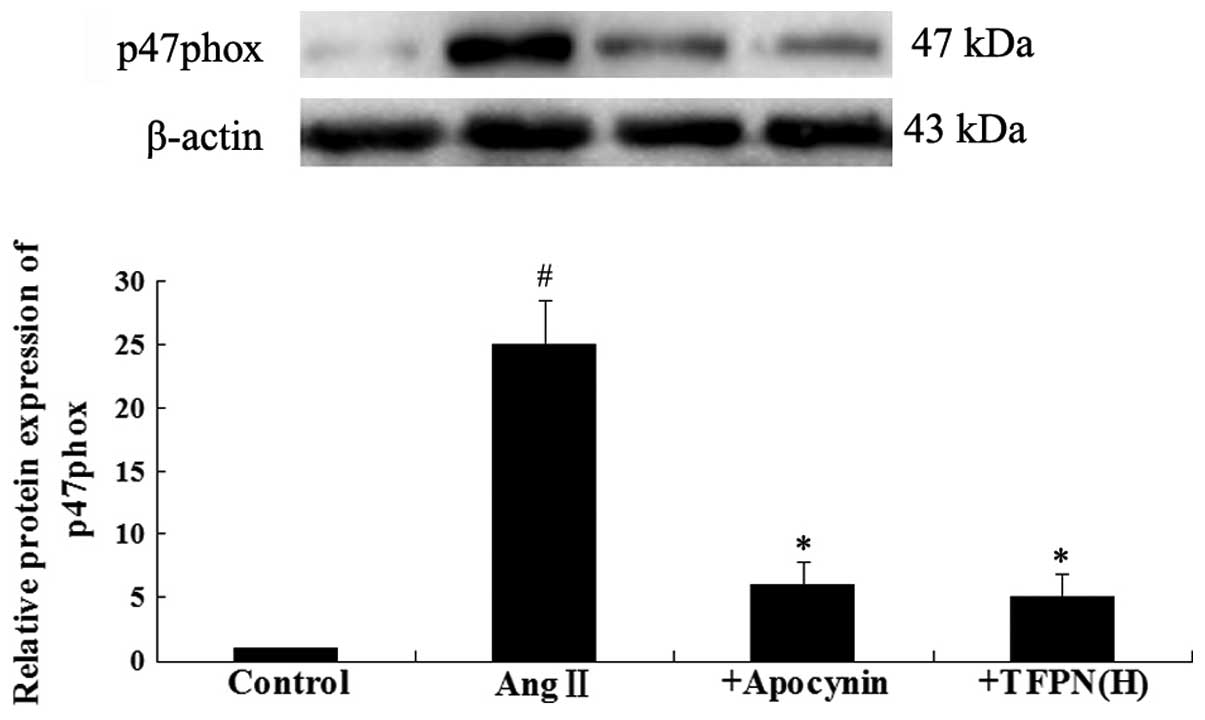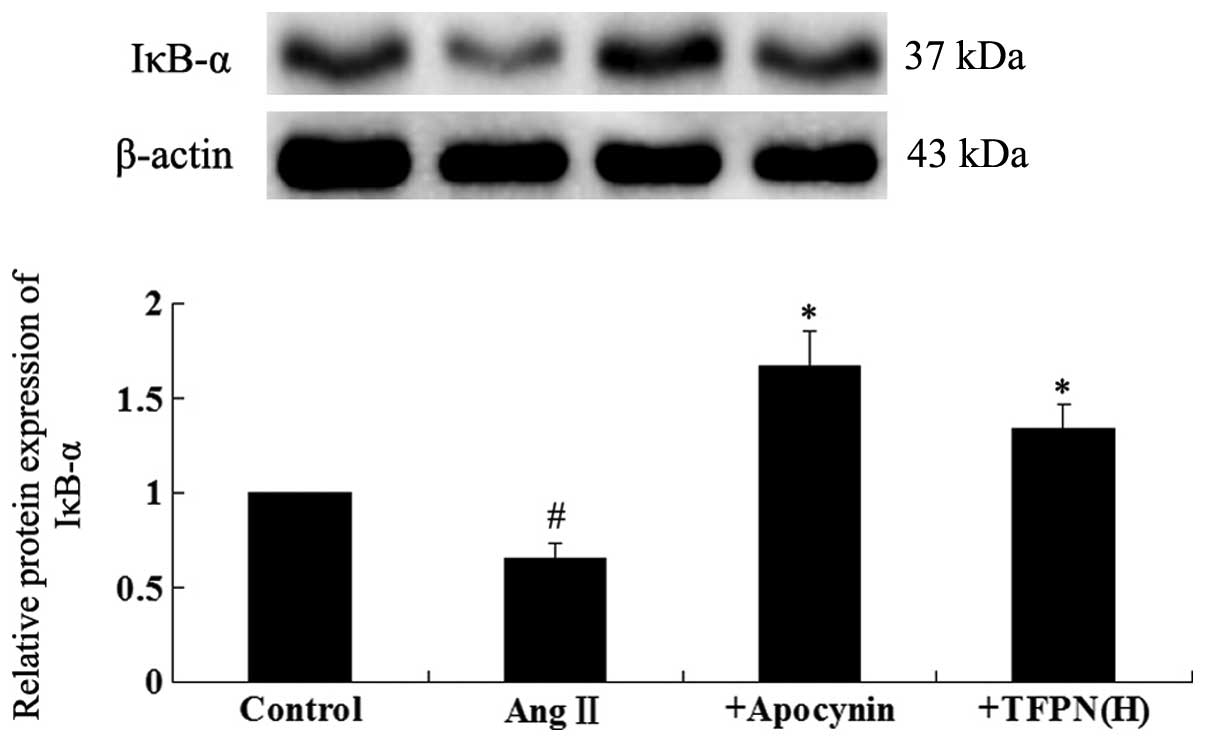|
1
|
Rajagopalan S, Kurz S, Münzel T, et al:
Angiotensin II-mediated hypertension in the rat increases vascular
superoxide production via membrane NADH/NADPH oxidase activation.
Contribution to alterations of vasomotor tone. J Clin Invest.
97:1916–1923. 1996. View Article : Google Scholar
|
|
2
|
Touyz RM and Briones AM: Reactive oxygen
species and vascular biology: implications in human hypertension.
Hypertens Res. 34:5–14. 2011. View Article : Google Scholar : PubMed/NCBI
|
|
3
|
Wang J, Hu X, Yin W and Cai H: Alkaloids
of plumula Nelumbinis. Zhongguo Zhong Yao Za Zhi. 16:673–675.
7031991.(In Chinese).
|
|
4
|
Lebeau J, Furman C, Bernier JL, Duriez P,
Teissier E and Cotelle N: Antioxidant properties of
di-tert-butylhydroxylated flavonoids. Free Radic Biol Med.
29:900–912. 2000. View Article : Google Scholar : PubMed/NCBI
|
|
5
|
Owen RW, Haubner R, Mier W, et al:
Isolation, structure elucidation and antioxidant potential of the
major phenolic and flavonoid compounds in brined olive drupes. Food
Chem Toxicol. 41:703–717. 2003. View Article : Google Scholar
|
|
6
|
Bergman M, Perelman A, Dubinsky Z and
Grossman S: Scavenging of reactive oxygen species by a novel
glucurinated flavonoid antioxidant isolated and purified from
spinach. Phytochemistry. 62:753–762. 2003. View Article : Google Scholar : PubMed/NCBI
|
|
7
|
Dugas AJ Jr, Castañeda-Acosta J, Bonin GC,
Price KL, Fischer NH and Winston GW: Evaluation of the total
peroxyl radical-scavenging capacity of flavonoids:
structure-activity relationships. J Nat Prod. 63:327–331. 2000.
View Article : Google Scholar : PubMed/NCBI
|
|
8
|
Mishra B, Priyadarsini KI, Kumar MS,
Unnikrishnan MK and Mohan H: Effect of O-glycosylation on the
antioxidant activity and free radical reactions of a plant
flavonoid, chrysoeriol. Bioorg Med Chem. 11:2677–2685. 2003.
View Article : Google Scholar : PubMed/NCBI
|
|
9
|
Jia SJ, Jiang DJ, Hu CP, et al:
Lysophosphatidylcholine-induced elevation of asymmetric
dimethylarginine level by the NADPH oxidase pathway in endothelial
cells. Vascul Pharmacol. 44:143–148. 2006. View Article : Google Scholar
|
|
10
|
Park JB, Charbonneau F and Schiffrin EL:
Correlation of endothelial function in large and small arteries in
human essential hypertension. J Hypertens. 19:415–420. 2001.
View Article : Google Scholar : PubMed/NCBI
|
|
11
|
Tomita N, Yamasaki K, Osako MK, Komai N,
Shimosato T and Morishita R: Combination therapy based on the
angiotensin receptor blocker olmesartan for vascular protection in
spontaneously hypertensive rats. Mol Med Rep. 2:733–738. 2009.
View Article : Google Scholar : PubMed/NCBI
|
|
12
|
Guzik TJ, West NE, Black E, et al:
Vascular superoxide production by NAD(P)H oxidase: association with
endothelial dysfunction and clinical risk factors. Circ Res.
86:E85–E90. 2000. View Article : Google Scholar
|
|
13
|
Cai H and Harrison DG: Endothelial
dysfunction in cardiovascular diseases: the role of oxidant stress.
Circ Res. 87:840–844. 2000. View Article : Google Scholar : PubMed/NCBI
|
|
14
|
Guzik TJ, Hoch NE, Brown KA, et al: Role
of the T cell in the genesis of angiotensin II induced hypertension
and vascular dysfunction. J Exp Med. 204:2449–2460. 2007.
View Article : Google Scholar : PubMed/NCBI
|
|
15
|
Griendling KK, Minieri CA, Ollerenshaw JD
and Alexander RW: Angiotensin II stimulates NADH and NADPH oxidase
activity in cultured vascular smooth muscle cells. Circ Res.
74:1141–1148. 1994. View Article : Google Scholar : PubMed/NCBI
|
|
16
|
Shi Y, Niculescu R, Wang D, Patel S,
Davenpeck KL and Zalewski A: Increased NAD(P)H oxidase and reactive
oxygen species in coronary arteries after balloon injury.
Arterioscler Thromb Vasc Biol. 21:739–745. 2001. View Article : Google Scholar : PubMed/NCBI
|
|
17
|
Ohtsu H, Frank GD, Utsunomiya H and Eguchi
S: Redox-dependent protein kinase regulation by angiotensin II:
mechanistic insights and its pathophysiology. Antioxid Redox
Signal. 7:1315–1326. 2005. View Article : Google Scholar : PubMed/NCBI
|
|
18
|
Lassègue B and Clempus RE: Vascular
NAD(P)H oxidases: specific features, expression, and regulation. Am
J Physiol Regul Integr Comp Physiol. 285:R277–R297. 2003.PubMed/NCBI
|
|
19
|
Kalinowski L and Malinski T: Endothelial
NADH/NADPH-dependent enzymatic sources of superoxide production:
relationship to endothelial dysfunction. Acta Biochim Pol.
51:459–469. 2004.PubMed/NCBI
|
|
20
|
Chandrasekar B, Mummidi S, Perla RP, et
al: Fractalkine (CX3CL1) stimulated by nuclear factor kappaB
(NF-kappaB)-dependent inflammatory signals induces aortic smooth
muscle cell proliferation through an autocrine pathway. Biochem J.
373:547–558. 2003. View Article : Google Scholar
|
|
21
|
Garcia GE, Xia Y, Chen S, et al:
NF-kappaB-dependent fractalkine induction in rat aortic endothelial
cells stimulated by IL-1beta, TNF-alpha, and LPS. J Leukoc Biol.
67:577–584. 2000.PubMed/NCBI
|
|
22
|
Zernecke A, Weber KS and Weber C: Combined
modulation of the mesangial machinery for monocyte recruitment by
inhibition of NF-kappaB. Am J Physiol Cell Physiol.
281:C1881–C1888. 2001.
|
|
23
|
Pomerantz JL and Baltimore D: Two pathways
to NF-kappaB. Mol Cell. 10:693–695. 2002. View Article : Google Scholar : PubMed/NCBI
|
|
24
|
Bonello S, Zähringer C, BelAiba RS, et al:
Reactive oxygen species activate the HIF-1alpha promoter via a
functional NFkappaB site. Arterioscler Thromb Vasc Biol.
27:755–761. 2007. View Article : Google Scholar : PubMed/NCBI
|
|
25
|
Yokoo T and Kitamura M: Antioxidant PDTC
induces stromelysin expression in mesangial cells via a tyrosine
kinase-AP-1 pathway. Am J Physiol. 270:F806–F811. 1996.PubMed/NCBI
|
|
26
|
Chen J, Zhang M, Zheng T-S and Tao J-H:
Study on antioxidant activities of ethanol extracts from lotus germ
in vitro. Food Science. 29:48–51. 2008.(In Chinese).
|
|
27
|
Hanna IR, Taniyama Y, Szöcs K, Rocic P and
Griendling KK: NAD(P)H oxidase-derived reactive oxygen species as
mediators of angiotensin II signaling. Antioxid Redox Signal.
4:899–914. 2002. View Article : Google Scholar : PubMed/NCBI
|
|
28
|
Ruiz-Ortega M, Ruperez M, Esteban V and
Egido J: Molecular mechanisms of angiotensin II-induced vascular
injury. Curr Hypertens Rep. 5:73–79. 2003. View Article : Google Scholar : PubMed/NCBI
|
|
29
|
Luo Z, Teerlink T, Griendling K, Aslam S,
Welch WJ and Wilcox CS: Angiotensin II and NADPH oxidase increase
ADMA in vascular smooth muscle cells. Hypertension. 56:498–504.
2010. View Article : Google Scholar : PubMed/NCBI
|
|
30
|
Wong BW, Wong D and McManus BM:
Characterization of fractalkine (CX3CL1) and CX3CR1 in human
coronary arteries with native atherosclerosis, diabetes mellitus,
and transplant vascular disease. Cardiovasc Pathol. 11:332–338.
2002. View Article : Google Scholar : PubMed/NCBI
|
|
31
|
Sullivan JC, Pardieck JL, Doran D, Zhang
Y, She JX and Pollock JS: Greater fractalkine expression in
mesenteric arteries of female spontaneously hypertensive rats
compared with males. Am J Physiol Heart Circ Physiol.
296:H1080–H1088. 2009. View Article : Google Scholar : PubMed/NCBI
|
|
32
|
Schäfer A, Schulz C, Fraccarollo D, et al:
The CX3C chemokine fractalkine induces vascular dysfunction by
generation of superoxide anions. Arterioscler Thromb Vasc Biol.
27:55–62. 2007.PubMed/NCBI
|















